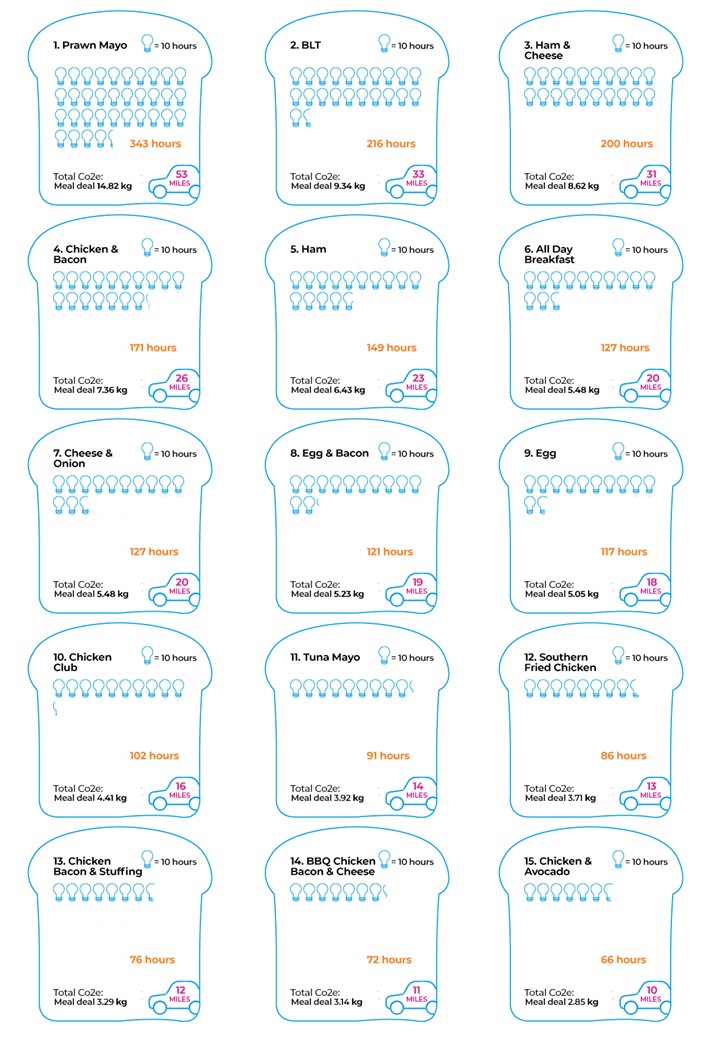In a world where we’re all trying to be greener and more eco-conscious, you may be surprised to know that your lunchbox could be contributing a massive amount of carbon to global output. ‘Meal deals’ are a staple in British culture, with over 7 million bought daily. So, we thought we’d look at the environmental impact of the nation’s favourite meal deals to help you understand the impact your lunch may be having.
As busy people, one of our biggest challenges is acknowledging the trade-off between convenience and sustainability. But let’s face it, when we’re tired and hungry, we tend to reach for the easiest option. Usually the one with convenient, disposable packaging that needs no preparation to consume.
The UK is very familiar with the supermarket meal deal; a popular lunchtime choice. A standard meal deal usually consists of a sandwich or wrap, a snack and a drink - all for a bargain price. However, …have you ever wondered about the impact that your quick and simple meal deal has had on the environment?
Whilst we acknowledge that there are many sustainable considerations to be had when choosing your lunch (Vegan? Line caught fish? Recycled packaging?), we were keen to keep our calculations as straightforward as possible, with the simple objective to make us stop and consider the impact that our lunch choices have on the environment.
Our methodology for calculating the impact is explained at the end of this blog. But, in essence, we included the nation’s favourite crisps, drink, the packaging and the main sandwich filling.
So which sandwich choice had the biggest CO2 emissions? You can see the full list in our infographic at the end of the blog
No 1 – The Prawn Mayo
Coming in at the top spot with the worst environmental impact, is the 1980s classic prawn mayo sandwich. Believe it or not, this simple sandwich contains an outstanding 19.18kg CO2e per 100g.
If you choose this filling as part of your meal deal, then the total footprint (including your crisps and drink) is 14.8kg CO2e – that’s the equivalent emissions to having a lightbulb on in your home for a whopping 343.4 hours!
If you want to look at it a different way, you will have to drive an average car (producing 280g CO2e per mile) fifty-three miles to clock up the same emissions.
That means if all 7 million regular Meal Deal customers chose a prawn mayo sandwich, it would be the equivalent of driving a shocking 369 million miles - which is the distance to Jupiter.
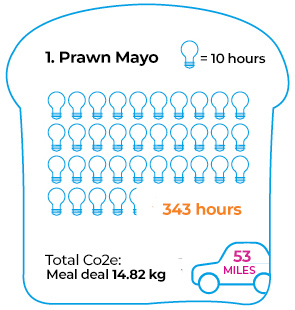
No 2 – the classic BLT
The second ‘worst’ sandwich to choose is a firm classic - the BLT. This filling consists of bacon, lettuce and tomato. For this calculation we used the bacon and tomato. The total CO2e of these two ingredients is 9kg - this is equivalent to lighting a standard 100W bulb for 216.4 hours.
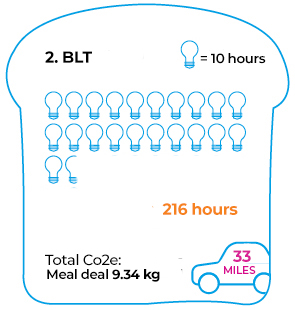
No 3 – Ham & Cheese
In third place, the simple ham and cheese sandwich. The total CO2e of the ham and cheese in this sandwich is 8.6kg, nearly half of the prawn mayo emissions. This equates to a lightbulb being on for nearly 200 hours, which is over a whole week.
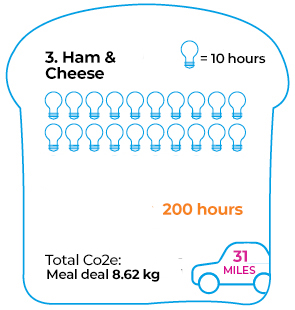
The Meal Deal filling with the least impact?
According to our calculations, the chicken & avocado filling produces the least CO2e, with only 2.9kg.
You’d still have to have your lightbulb on for 66 hours to clock up the same emissions though, just over a weekend.
But that is a far more respectable 2.7 solid days of leaving your lightbulb on, compared to over two weeks (14.3 days) for the prawn mayo sandwich filling.
If you, like us, questioned the sustainability of importing avocados, we discovered that they have a surprisingly low carbon footprint compared to dairy or meat produce.
We’ve included below some of the most interesting and myth-busting articles we found during our research.
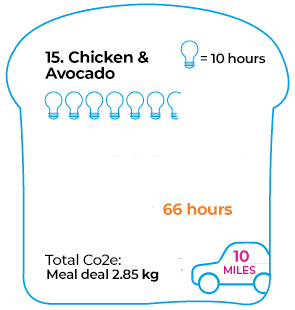
Conclusion
We have had a bit of fun looking at the impact that a humble meal deal can have on our precious environment. But despite the simplicity of our study, the exercise has strongly highlighted how, in a world which is driven by convenience, our split-second choices have a real and tangible impact.
t’s certainly made us stop and think for a moment longer before reaching for our favourite meal deal. And in fact, made us think long and hard about changing our lunchtime habits. For example, choosing a home-made lunch the carbon emissions are lower due to less transport, packaging and refrigeration – and if you can grow some of your own fruit and veg at home.. even better!.
So, with that in mind we thought we’d share some practical tips and ideas on how to make morse sustainable decisions when planning your lunch.
Tips for greener lunches
Packaging
Buying your lunch on the go means you can’t use your favourite reusable lunch box, but there are a few things you can look out for when it comes to packaging.
The right packaging can have quite a big impact on the carbon footprint of your Meal Deal. For example, choosing a cardboard product over plastic wrapping is a great start. Knowing whether you can recycle something is important. We have a handy guide here that tells you what the different recycling symbols mean on everyday packaging.
There are also a lot of brands that are choosing to use 100% recycled materials to produce the packaging which is a great way to be more planet friendly. TetraPack have a great little calculator here which tells you the CO2e emissions associated with different types of packaging.
Generally reducing your plastic is a great way to lower your carbon footprint. Our non-exec director Louise Boland spoke to us about her brave journey to live plastic free. You can watch the video here.
Leftover food
Not all of us can finish our lunch sometimes, and if we don’t want to save it for later, it is essential to know where to dispose of our leftovers. The UK wastes 6.6 million tonnes of food every year, and 4.5 million tonnes of it is wasted due to either lack of knowledge around proper food disposal, lack of time and lack of understanding of the impact. This is equivalent to 90 Royal Albert Halls full of wasted food.
As part of our own initiative to turn our outside decking area into an eco-space, we invested in a Hotbin to compost the food we waste in the office. It’s a great way to make use of all that wasted nutrition. You can find out what we did here
Love Food Hate Waste also provide some helpful tips to try and avoid food waste:
- Make a shopping list to plan for your shop
- Use your freezer more
- Use leftover food recipes and make delicious soups and other meal.
We believe that choosing 100Green as your energy provider is a lifestyle choice and not just an energy choice. That’s why we fill our blog and our social feeds with ideas and thoughts on how we can live more sustainable lives.
You can view our blog articles here or follow us on Facebook, Instagram and Twitter
How impact was calculated
First, the most popular sandwich or wrap choices were identified and then the main filling for each one was established (where data was available).
To make easy comparisons, this was combined with the nation's favourite snack and drink choice - which turned out to be Walkers crisps and a Coca Cola. This gave a base measurement of 250g CO2e. We combined this with the base estimate for sandwich packaging which was 39.7g CO2e.
The main ingredients of the sandwich, the snack and drink were all combined to give a total CO2e (Carbon Dioxide Equivalent) calculation that helped us compare the main variables found in a meal deal. Note that bread was not included.
To help provide context, we then compared the CO2 emissions to switching on a standard lightbulb in your home. (Based on a standard 100W light bulb producing 172.6g for every 4 hours it is on.)
Interesting articles we found during our research:
Are avocados worse for the environment than meat?
How Much CO2e Does the Meat Industry Produce? (Hint: Way More Than You Think)
CO2e associated with different types of packaging)
What appliances in my home have the biggest carbon footprint?
